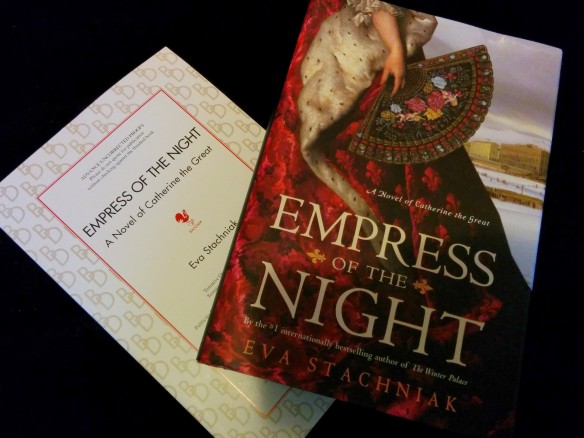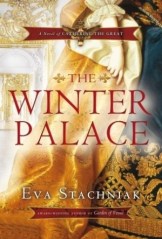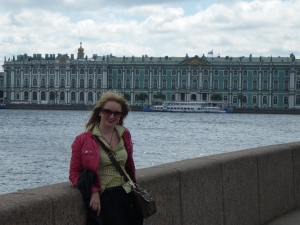“I shall either rule or perish. This is what I’ve learned.”
— Empress of the Night by Eva Stachniak
*SOME SPOILERS*
At the precipice of a deadly cliff, Russia’s fate hangs in the balance. Catherine the Great is dying. In her final hours, as the rest of the Russian court vie for position and order to quell the mounting chaos, Catherine relives her impressive rise to power, how she ruled and how she loved. As Catherine reflects on her life, the reader is taken back to her arrival as Sophie, a young and seemingly insignificant princess of Anhalt-Zerbst betrothed to Russia’s heir Peter III.
Destined to be an unhappy marriage, readers are given a glimpse into Catherine’s struggle to please Elizabeth, the then controlling Empress of all the Russias, and her husband, who is more interested in his toy soldiers and battle strategy than getting to know his new wife. Isolated and ignored, Catherine looks for love elsewhere, but it is not until she meets the dashing young officer Grigory Orlov that she finds true love as well as true ambition, and with his help she seizes the Russian throne out from under her incompetent husband’s feet. However, the greatest love of her life arrives when she is Empress, Grigory Potemkin, and it is with him that Catherine soars, taking Russia to its new potential as a powerful and influential empire in the field of war and politics.
But keeping her position proves to be a constant battle of wits, knowing who to trust and who to deceive and sometimes, despite her best efforts, love has to come second. Nearing the end of her reign, Catherine attempts to prepare Russia for a new ruler, one who is not her first born son but her grandson Alexander (who would become Alexander I and Napoleon’s greatest opponent). Conditioned for the throne from the beginning, Catherine knows he will make a great ruler, but even Catherine the Great cannot control what happens beyond the grave.
I cannot emphasize enough how much I wanted to love this book. Catherine the Great has been an important historical woman of strength in my life: one who took what she wanted against all odds, expanding and strengthening Russia so all of Europe would recognize it as a fellow superpower. I remember looking up in awe at the floor-to-ceiling portrait Catherine had commissioned of herself after her coup: a woman in complete control her power that said to all of Russia that she was a woman, but a woman with the capabilities of a man to rule and rule well. I didn’t see this woman in Stachniak’s portrayal.
I realize that the mantra these days in publishing is “sex sells” ever since Fifty Shades of Grey took the book world by storm (an unfortunate event). However, I deliberately don’t pick up those books for a reason, which was why I became disappointed with this second installment to the Catherine the Great trilogy when Catherine’s sex life and exchanging of sex partners dominated the book’s storyline from the get-go.
The book was already off to a rocky start when after a brief prelude, introducing the fact that Catherine is looking back on her life while she is on her deathbed, it for the most part repeated events from The Winter Palace only this time from Catherine’s point of view. I found this to be an unnecessary recap. Readers are likely to have already read The Winter Palace and aren’t looking to read the same story twice.
After this slow start, I had higher hopes for the rest of the book to show me Catherine’s attributed greatness, but instead I was continuously given accounts of her loves, one after the other. Fair enough, Catherine was known for her sexual appetite and the glamorous gifts, such as entire palaces, that she bestowed on her favourites, but that wasn’t all that I came to read about. I found myself asking, “Where is the politics? Where is the diplomacy?” Throughout Empress of the Night the wars Catherine fought in, the foreign negotiations she headed were only briefly mentioned in passing before it moved on to her newest lover or her lack of libido in her old age.
I suppose one could say Stachniak is attempting to show the woman without the crown, and I truly appreciate the goal of showing the more human side of history’s most magnanimous rulers, but a more balanced combination of fact and fiction would have been appreciated. Solely looking at Catherine from an amorous perspective is lovely, but not when her choices and actions begin to appear ruled by men. Yes, Catherine shows strength and control, but there was only one occasion that I truly witnessed the Catherine the Great I had wanted to see the entire time, which was when she put her newest dopey lover, Platon, who was in constant need of reassurance, in his place when speaking of age and Bonaparte: “…Bonaparte takes his army to the mountains. Spreads his forces out, so the Austrians spread their forces out. Then he concentrates his troops and strikes them at the weakest points. The man is unstoppable…Bonaparte…is only twenty-seven years old” (Platon is twenty-nine). I was impressed after reading this, as I had glimpsed the Catherine who did indeed rule—as Beyoncé would say, “Bow down, bitches!”
But alas, this scene was only a brief moment of respite from the fairly dry repertoire that Empress of the Night became for me. Also, one thing that truly irked me was a sex scene near the beginning of the book. Spoiler alert, but I am sorry, I cannot for the life of me see Catherine the Great allowing her head to be forcefully pushed down beneath the covers and into a man’s nether regions no matter how much she loved him…perhaps initiating the act herself, taking control as only a great woman knows how, showing that she owns him and not the other way around; but this is just my opinion and purely a subjective one, I suppose, although I think a few other readers may agree with me.
Stachniak’s powerful imagery remains, however, and I was once again transported back to Russia. But without the vibrant character of Empress Elizabeth to steal the show away as she did in the previous book, the storyline fell flat. Similarly to Catherine collapsing into a state of foggy incoherence at the beginning, the reader is never quite alert to the events that follow.
If you want to know the Catherine who ruled and not the men she bedded, I suggest you read Catherine the Great: Portrait of a Woman by Robert K. Massie. While I haven’t read the book myself, Massie is a renowned biographer of Russian rulers. Considering how much I love Catherine the Great’s story, I obtained a copy of the book unsure of when or if I would actually read it (I don’t read a lot of nonfiction–a respite I have been thoroughly indulging in ever since graduating university); however, Massie’s book has moved up in the “to read” pile. I usually forgo the history lesson for the fictional story with the history, but I still haven’t met Catherine the way I had envisioned—It seems nonfiction is now the way to go.
A small spoiler: Catherine dies at the end of Stachniak’s book after a long and drawn out trip down memory lane. There is one more book left in Stachniak’s Catherine the Great trilogy, although there will be no Catherine in the next one, as far as I can tell. I want to say I will continue with the series, as I do hate giving up on books, which was why it took me so long to finish this one, but at this point in time I am undecided. Unless the descriptive copy is a stellar grabber, I might have to bid adieu to this trilogy that had the best of intentions but personally didn’t take me where I wanted to go.
2 out of 5 book thumbs up
First Reads copy via Goodreads provided to me by Random House of Canada.
Signed copy provided to me by Helen Heller Agency Inc.
Empress of the Night by Eva Stachniak, published by Doubleday, Random House of Canada, © 2014
Available at Random House of Canada, Indigo, Amazon, and independent bookstores everywhere March 25, 2014.





